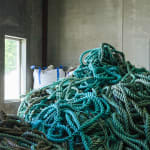
Scientific start-up, Parx Materials has partnered with Norwegian-based hygiene expert, ZincIn, to develop antibacterial food trays made with recycled fishing waste. An industry which is currently responsible for at least 10 per cent or 640,000 tonnes of marine litter. Using a patented self-cleaning technology, the trays ensure over 99.9 per cent reduction in bacteria when compared to typical food trays — saving our health, while saving the planet.
The partnership coincides with an increasing need for robust hygiene protocols in hospitality environments. Following the COVID-19 pandemic, there is no doubt there will be higher demand for antibacterial materials and products for these settings.
ZincIn specialises in creating unique self-cleansing products. The partnership with Parx Materials, a Dutch start-up and creator of Saniconcentrate, allows ZincIn to develop these products on a mass scale — catering to the currently changing needs of the food and hospitality markets.
Saniconcentrate has been proven to deliver a broad-spectrum antibacterial performance reaching an efficacy of 99.9 per cent and higher, measured according to ISO 22196 and JIS Z2801. Moreover, new test results demonstrate the additive also reduces the COVID-19 virus on surfaces by up to 99 per cent in 24 hours.
ZincIn’s trays achieve this level of efficacy while also reusing the earth’s existing resources. The company uses NOPREC granulate to manufacture its trays, created from granules made from the roles, plastic tanks and other waste discarded by the fishing industry. These granules are fitted with Parx Material’s unique additive, Saniconcentrate, to ensure its antimicrobial properties.
Saniconcentrate has been specifically formulated to be suitable for food applications. Unlike traditional antibacterial additives, most of which use heavy metal ions to kill bacteria, Saniconcentrate achieves its efficacy without biocides, leaching or any harmful side effects.
“Working with Parx Materials’ antimicrobial technology sparked a whole new array of possibilities that can bring benefits and advantages to our lives,” explained Kjetil Christoffersen, founder of ZincIn. “Combining it with the NOPREC recycled material that has served our food chain already before and now once again, seemed like a logical step.”
Inspired by the vision and product concepts of ZincIn, Parx Materials has also joined Christoffersen as a shareholder and board member in ZincIn, further strengthening its alliance.


